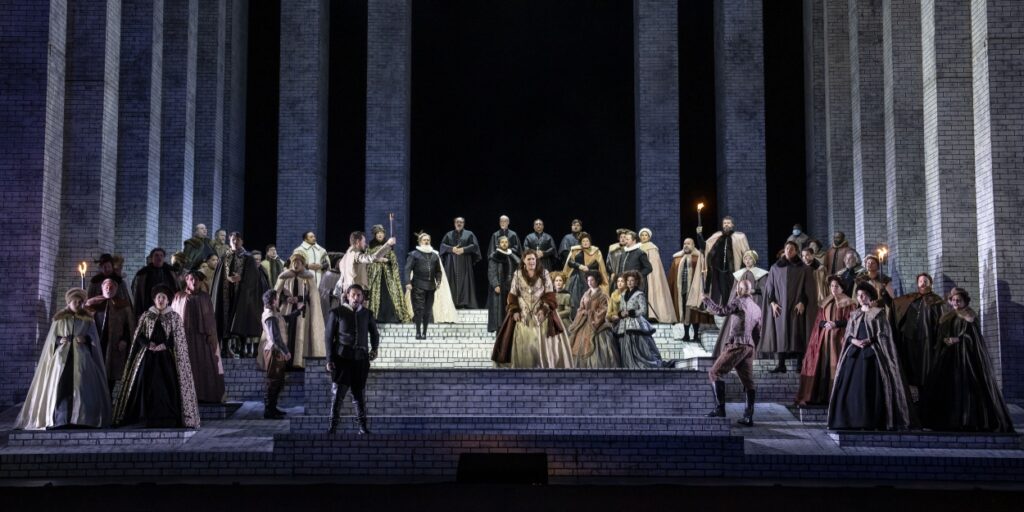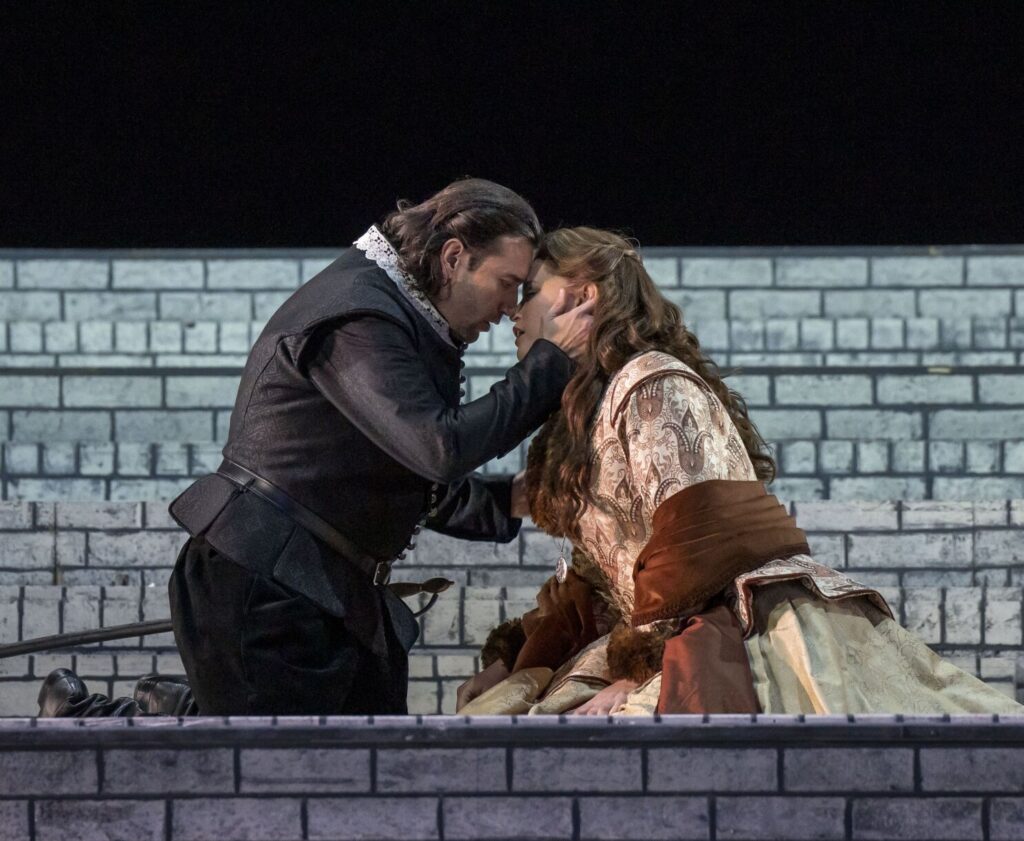
By striking the right balance in nearly every aspect, the Lyric’s current production of Verdi’s Don Carlos may be the perfect opera. The most transfixing element in the mix may be Robert Jones’s magnificent set. Color and lighting soften its dramatic dimensions, but they don’t detract from its galvanizing impact. Jones’s set is the constant that grounds the other components of the opera and gives Don Carlos its majestic character. With its imposing Greco-Roman columns, the stage appears to be the entrance to a massive temple of stone. Pale gray and soaring, it exudes a timeless permanence; a presence that inspires awe and radiates authority. It’s also the tangible and constant reminder that the actions unfolding before the audience have significant implications.
The story driving Don Carlos is much more human in scale and deals with matters most of us grapple with during some part of our lives. The volatile nature of love, the weight of familial obligations, the sanctity of friendship and the inevitability of death are all present in Don Carlos. Like legacies that get passed from generation to generation; they’re as certain and as they are inescapable. Opera enjoys the unique ability to translate the emotions our humanity subjects us to with poignancy and depth. In Don Carlos, we watch and listen with admiration as the title character leans on integrity and honor to navigates a labyrinth of heavy challenges.

Taking place in a brutal period of Spanish history 700 years ago, the opera is set in the harrowing days of the Inquisition when both the Church and the monarchy used brute force to cement power. Carlos (Joshua Guerrero) is the son of the Spanish king. One of his misfortunes is that he is in love with his father’s wife, Elisabeth (Rachel Willis- Sorenson). Because women during the time were often used as transactional commodities, that fact is not nearly as lurid as it might seem. Carlos had fallen in love with Elizabeth before she was promised to his widowed father. His infatuation with the woman he could no longer have didn’t prevent another woman from being attracted to him. As he longed for Elisabeth, Carlos made an enemy of Eboli (Clementine Margaine), whose interest in him could not be returned. When Eboli sings “Your life is in my hands” after discovering Carlos’s feeling for Elizabeth; her voice, through the dynamism of opera, let’s you feel the full weight her threat.
That complications and opera are familiar bedfellows is well known and Don Carlos is of course no exception. The difference in this production is that it gives you time to understand and digest the relationships between the key figures in the story. You’re also better able to build a connection to the larger world they inhabit. That ability causes to the opera to clock in at three and a half hours, but the investment is well spent. By giving the work the full five acts as intended by Verdi, the relationship between the characters and their concerns are fully formed and consequential. You’re allowed the luxury of absorbing the depth of trust and devotion Carlos shares with his friend Rodrigue (Igor Golovatenko). Whether acting as a confidante or as the voice of reason, Golovatenko’s Rodrigue is steadfast in his allegiance to Carlos. Full of untainted honesty and sincerity, the way Rodrigue expresses his devotion to his friend in song reads as heroic; an ideal to be strived for. Their joint goal of helping the Flemish escape the oppression inflicted on them by Carlos’s father, King Philippe II, is one that places both men in serious jeopardy and stands as a crucial plot point in the saga.

The ability of the human voice to delve down and tap into senses that highlight our shared vulnerabilities and fears isn’t exclusive to opera, but few other music forms can accomplish it so beautifully. When Philippe (Dmitri Belosselskiy) laments loving a woman who does not love him, the pathos in his voice is as wrenching as the most mournful dirge. Regret takes on unexpected dimensions when sung in bass, the lowest male voice type. Belosselskiy’s plaintive solo introduced the ear to new capabilities of the bass range.
Exuding consummate control and power, another bass, Soloman Howard as the Grand Inquisitor; may have been even more arresting for using his voice to achieve a completely different end. Howard’s possesses the kind of voice that resonates so deeply that it seems to come from another world. Time evaporates and only the intent of the words he’s singing seem to matter. In Don Carlos, those words hold no hope and are as frigid as winter. Dark as they are, they don’t extinguish the promise of possibility that flower in other segments of the opera.
Beautiful and restrained, Verdi’s score reflects his characteristic subtlety. Its reserve helped heighten the tension and uncertainty of the period it chronicles when innocent acts often ended in tragedy. That Don Carlos was sung in French rather than Italian honors the original intentions of the opera. It also offers audiences the chance to enjoy opera with fresh shadings of sound.
Don Carlos
Through November 25, 2022
Lyric Opera of Chicago
Civic Opera House
20 N. Upper Wacker Drive
Chicago, IL 60606